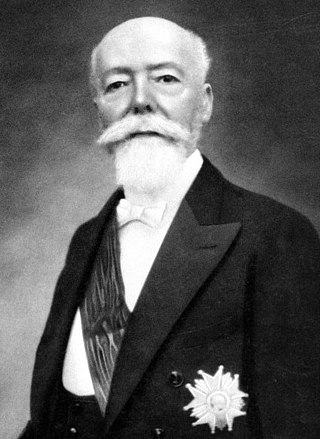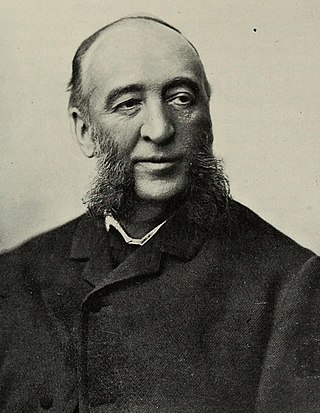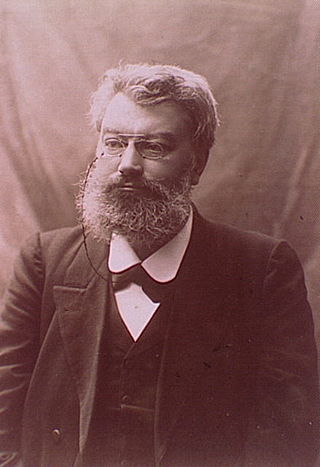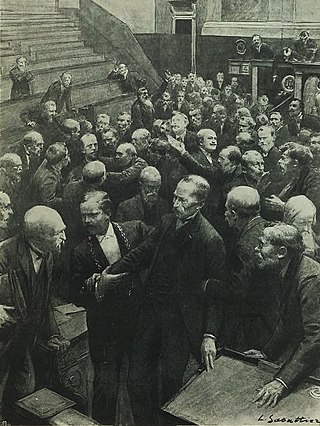This article may be a rough translation from French. It may have been generated, in whole or in part, by a computer or by a translator without dual proficiency.(April 2023) |
Contents
- Career
- Prime minister
- Later life
- Combes's Ministry, 7 June 1902 – 24 January 1905
- Notes
- Further reading
- External links
Career
Émile Combes was born on 6 September 1835, in Roquecourbe, Tarn, the sixth child of Jean Combes, a dressmaker, and Marie-Rose Bannesborn.
He first learned Latin from his public schoolteacher and then from his godfather and cousin, a priest named Jean Gaubert. Gabriel Merle, biographer of Émile Combes, describes Jean Gaubert: "He has the prestige and authority of the priesthood and education. He is obeyed. And if he demands sacrifices, he also imposes them on himself. His insistence that one of his younger cousins should become a priest is astonishing. Having failed with Philippe around 1840 and Émile in 1847, he missed his last attempt with Henri around 1860." [4]
Thanks to his knowledge of Latin, twelve-year-old Émile Combes entered the fourth year of the minor seminary in Castres. His godfather supported him financially through his studies, first at the seminary; then at the École des Carmes, an ecclesiastical school where future priests wishing to study at the Sorbonne were trained; and finally at the Grand Séminaire d'Albi, where Émile Combes wore the cassock and was tonsured. Here, his vocation to the priesthood was seen as unserious, and despite initial efforts to persist, he would abandon the idea before ordination.
His anti-clericalism would later lead him into becoming a Freemason. [5] [6] He was also in later life a spiritualist. [7] He later took a diploma as a doctor of letters (1860). He then studied medicine and graduated in 1867, and setting up in practice at Pons in Charente-Inférieure. In 1881, he presented himself as a political candidate for Saintes, but was defeated. In 1885, he was elected to the senate by the département of Charente-Inférieure. He sat in the Democratic left, and was elected vice-president in 1893 and 1894. The reports which he drew up upon educational questions drew attention to him, and on 3 November 1895, he entered the Leon Victor Auguste Bourgeois cabinet as minister of public instruction, resigning with his colleagues on 21 April following. [8]
Prime minister
He actively supported the Waldeck-Rousseau ministry, and upon its retirement in 1902, he was himself charged with the formation of a cabinet. In this, he took the portfolio of the Interior, and the main energy of the government was devoted to an anti-clerical agenda. [9] The parties of the Left united upon this question in the Bloc republicain, supported Combes in his application of the law of 1901 on the religious associations, and voted the new bill on the congregations (1904). Under his guidance, France took the first definite steps toward the separation of church and state. [8] By 1904, through his efforts, nearly 10,000 religious schools had been closed, and thousands of priests and nuns left France rather than be persecuted. [10]
Combes was vigorously opposed by all the conservative parties, who saw the mass closure of church schools as a persecution of religion. Combes led the anti-clerical coalition on the left, facing opposition primarily organized by the pro-Catholic party Action libérale populaire (ALP). ALP had a stronger popular base, with better financing and a stronger network of newspapers, but had far fewer seats in the Chamber of Deputies. [11]
Among people who looked with favor on his stubborn enforcement of the law, he was familiarly called le petit père. [8] In October 1904, his Minister of War, General André, was uncovered 'republicanizing' the army. He took the promotion process out of the hands of senior officers and handled it directly as a political matter. He used Freemasons to spy on the religious behavior of all 19,000 officers; they flagged the observant Catholics and André made sure they would not be promoted. Exposed as the Affaire Des Fiches , the scandal undermined support for the Combes government. It also undermined morale in the army, as officers realized that hostile spies examining their private lives were more important to their careers than their own professional accomplishments. [12]
Finally, the defection of the Radical and Socialist groups induced him to resign on 17 January 1905, although he had not met an adverse vote in the Chamber. His policy was still carried on; and when the law of the separation of church and state was passed, all the leaders of the Radical parties entertained him at a noteworthy banquet in which they openly recognized him as the real originator of the movement.
Later life
The campaign for the separation of church and state was the last big political action in his life. While still possessed of great influence over extreme Radicals, Combes took but little public part in politics after his resignation from the premiership in 1905. He joined the Aristide Briand ministry in October 1915 as one of the five Elder Statesmen, but without portfolio. [13]
According to Geoffrey Kurtz, the years of Émile Combes' administration were a period of social reform "without equal" during the era of the Third Republic, which included such reforms as an eight-hour day for miners, a ten-hour day for many workers, the lowering of mandatory military service from 3 to 2 years, the elimination of certain middle-class draft exemptions, and some modest public assistance for the chronically ill, the disabled, and the elderly. [14] In 1903, safety standards were extended to shops and offices. [15] In addition, a 1904 law "pioneered assistance to the children of single mothers, ignoring invidious distinctions between married and single mothers, in order to prevent abandonment." [16]
Combes died on 25 May 1921 in Pons, Charente-Maritime.
Combes's Ministry, 7 June 1902 –24 January 1905
- Émile Combes – President of the Council and Minister of the Interior and Worship
- Théophile Delcassé – Minister of Foreign Affairs
- Louis André – Minister of War
- Maurice Rouvier – Minister of Finance
- Ernest Vallé – Minister of Justice
- Charles Camille Pelletan – Minister of Marine
- Joseph Chaumié – Minister of Public Instruction and Fine Arts
- Léon Mougeot – Minister of Agriculture
- Gaston Doumergue – Minister of Colonies
- Émile Maruéjouls – Minister of Public Works
- Georges Trouillot – Minister of Commerce, Industry, Posts, and Telegraphs
Changes
- 15 November 1904 – Maurice Berteaux succeeds André as Minister of War
Notes
- ↑ Ce que la France doit aux francs-maçons (Laurent KUPFERMAN and Emmanuel PIERRAT - Grund ed. - 2012)
- ↑ Dictionnaire universel de la Franc-Maçonnerie (Monique Cara, Jean-Marc Cara and Marc de Jode - Larousse ed. - 2011)
- ↑ Histoire de la Franc-Maçonnerie française (Pierre Chevallier, Fayard ed., 1975)
- ↑ Merle, Gabriel (1995). Émile Combes. Paris: Fayard. ISBN 978-2-213-59386-9.
- ↑ Masonic references in the works of Charles Williams Grand Lodge of British Columbia and Yukon 2007
- ↑ Burke, Peter The New Cambridge Modern History p. 304 (1979 Cambridge University)
- ↑ Bigots united
- 1 2 3 One or more of the preceding sentences incorporates text from a publication now in the public domain : Chisholm, Hugh, ed. (1911). "Combes, Émile". Encyclopædia Britannica . Vol. 6 (11th ed.). Cambridge University Press. pp. 751–752.
- ↑ "Emile Combes who boasted of taking office for the sole purpose of destroying the religious orders. He closed thousands of what were not then called 'faith schools'" Bigots united in the Guardian, 9 October 2005
- ↑ Burns, Michael. France and the Dreyfus Affair: A Documentary History. 1999 (Palgrave Macmillan) ISBN 0-312-21813-3 p. 171
- ↑ Benjamin F. Martin, "The Creation of the Action Libérale Populaire: an Example of Party Formation in Third Republic France." French Historical Studies 9.4 (1976): 660–689. online
- ↑ Douglas Porch, The March to the Marne: The French Army 1871-1914 (2003) excerpt and text search pp 92–104, is the most thorough account in English
- ↑
 One or more of the preceding sentences incorporates text from a publication now in the public domain : Chisholm, Hugh, ed. (1922). "Combes, Justin Louis Émile". Encyclopædia Britannica . Vol. 30 (12th ed.). London & New York: The Encyclopædia Britannica Company. p. 729.
One or more of the preceding sentences incorporates text from a publication now in the public domain : Chisholm, Hugh, ed. (1922). "Combes, Justin Louis Émile". Encyclopædia Britannica . Vol. 30 (12th ed.). London & New York: The Encyclopædia Britannica Company. p. 729. - ↑ Kurtz, Geoffrey (2014). Jean Jaurès: The Inner Life of Social Democracy. Pennsylvania State University Press. p. 118. ISBN 9780271065823.
- ↑ Stewart, Mary Lynn (1989). Women, Work, and the French State: Labour Protection and Social Patriarchy, 1879-1919. McGill-Queen's University Press. p. 59. ISBN 9780773562059.
- ↑ The Oxford Encyclopedia of Women in World History Volume 1 By Bonnie G. Smith, 2008, P.348
Further reading
- Akan, Murat. The Politics of Secularism: Religion, Diversity, and Institutional Change in France and Turkey (2017).
- Arnal, Oscar L. "Why the French Christian Democrats Were Condemned." Church History 49.2 (1980): 188–202. online
- Coffey, Joan L. "Of Catechisms and Sermons: Church-State Relations in France, 1890–1905." Church history 66.1 (1997): 54–66. online
- McManners, John. Church and State in France, 1870–1914 (Harper & Row, 1972), pp. 125–55.
- Mayeur, Jean-Marie Mayeur and Madeleine Rebérioux. The Third Republic from its Origins to the Great War, 1871-1914 (1984), pp. 227–44
- Merle, Gabriel. Emile Combes (1995), p. 1, 662 p.; standard biography, in French
- Partin, Malcolm. Waldeck-Rousseau, Combes, and the Church: the Politics of Anticlericalism, 1899–1905 (1969)
- Sabatier, Paul. Disestablishment in France (1906) online
External links
Émile Combes | |
|---|---|
 | |
| Prime Minister of France | |
| In office 7 June 1902 –24 January 1905 |












